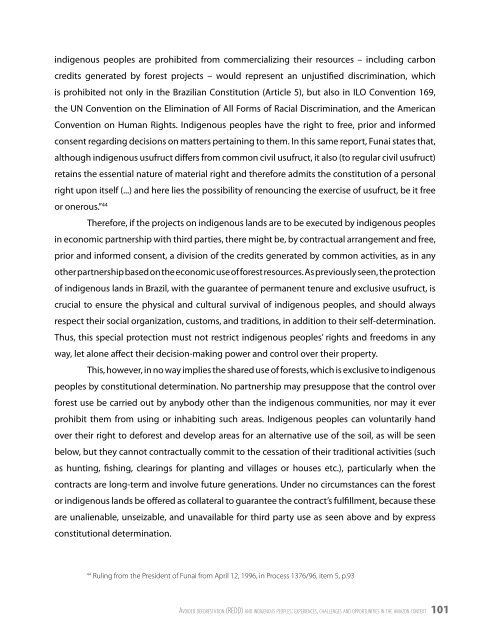Avoided Deforestation (REDD) and Indigenous ... - Amazon Fund
Avoided Deforestation (REDD) and Indigenous ... - Amazon Fund
Avoided Deforestation (REDD) and Indigenous ... - Amazon Fund
Create successful ePaper yourself
Turn your PDF publications into a flip-book with our unique Google optimized e-Paper software.
indigenous peoples are prohibited from commercializing their resources – including carbon<br />
credits generated by forest projects – would represent an unjustified discrimination, which<br />
is prohibited not only in the Brazilian Constitution (Article 5), but also in ILO Convention 169,<br />
the UN Convention on the Elimination of All Forms of Racial Discrimination, <strong>and</strong> the American<br />
Convention on Human Rights. <strong>Indigenous</strong> peoples have the right to free, prior <strong>and</strong> informed<br />
consent regarding decisions on matters pertaining to them. In this same report, Funai states that,<br />
although indigenous usufruct differs from common civil usufruct, it also (to regular civil usufruct)<br />
retains the essential nature of material right <strong>and</strong> therefore admits the constitution of a personal<br />
right upon itself (...) <strong>and</strong> here lies the possibility of renouncing the exercise of usufruct, be it free<br />
or onerous.” 44<br />
Therefore, if the projects on indigenous l<strong>and</strong>s are to be executed by indigenous peoples<br />
in economic partnership with third parties, there might be, by contractual arrangement <strong>and</strong> free,<br />
prior <strong>and</strong> informed consent, a division of the credits generated by common activities, as in any<br />
other partnership based on the economic use of forest resources. As previously seen, the protection<br />
of indigenous l<strong>and</strong>s in Brazil, with the guarantee of permanent tenure <strong>and</strong> exclusive usufruct, is<br />
crucial to ensure the physical <strong>and</strong> cultural survival of indigenous peoples, <strong>and</strong> should always<br />
respect their social organization, customs, <strong>and</strong> traditions, in addition to their self-determination.<br />
Thus, this special protection must not restrict indigenous peoples’ rights <strong>and</strong> freedoms in any<br />
way, let alone affect their decision-making power <strong>and</strong> control over their property.<br />
This, however, in no way implies the shared use of forests, which is exclusive to indigenous<br />
peoples by constitutional determination. No partnership may presuppose that the control over<br />
forest use be carried out by anybody other than the indigenous communities, nor may it ever<br />
prohibit them from using or inhabiting such areas. <strong>Indigenous</strong> peoples can voluntarily h<strong>and</strong><br />
over their right to deforest <strong>and</strong> develop areas for an alternative use of the soil, as will be seen<br />
below, but they cannot contractually commit to the cessation of their traditional activities (such<br />
as hunting, fishing, clearings for planting <strong>and</strong> villages or houses etc.), particularly when the<br />
contracts are long-term <strong>and</strong> involve future generations. Under no circumstances can the forest<br />
or indigenous l<strong>and</strong>s be offered as collateral to guarantee the contract’s fulfillment, because these<br />
are unalienable, unseizable, <strong>and</strong> unavailable for third party use as seen above <strong>and</strong> by express<br />
constitutional determination.<br />
44 Ruling from the President of Funai from April 12, 1996, in Process 1376/96, item 5, p.93<br />
Av o i d e d d e f o re s t A t i o n (redd) A n d i n d i g e n o u s p e o p l e s: experiences, chAllenges A n d o p p o r t u n i t i e s in t h e A m A zo n c o n t e x t 101
















